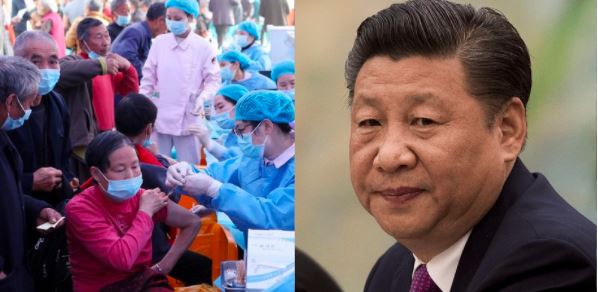On April 13, the first batch of the German-produced Pfizer-BioNTech COVID-19 vaccine arrived in mainland China and was made available for vaccination at a cost to Chinese people. This is the first time the Chinese regime has permitted the administration of an imported COVID-19 vaccine to Chinese citizens.
The launch of the Pfizer-BioNTech vaccine was not announced by Fosun Pharma until April 13th. Censors took down similar stories in China’s media and posts on social media sites hours after they were released. Chinese citizens heard about the delivery of the first batch of BioNTech vaccine from saved websites.
In December 2020, the importer, Fosun Pharma of Shanghai, China, placed an order for 100 million doses of the effective German-made COVID-19 vaccine for the mainland. The number of doses available in this first batch is unknown.
The Chinese government has approved five locally produced vaccines for use in an emergency and has vaccinated people without charging a fee. At the same time, the regime’s vaccine diplomacy policy, which includes pressuring Taiwan’s allies to abandon their help in exchange for vaccines, aims to sell vaccines to developing countries.
On April 10, Chinese CDC Director George Fu Gao acknowledged that China-made vaccines “don’t have very good safety rates,” and proposed that various vaccines be mixed to improve efficacy.
Fosun Pharma revealed on Dec. 17, 2020, that it had placed an order for 100 million doses of German-made vaccines with a total contract value of 500 million euro ($600 million) and a unit price of 5 euro ($6).
In comparison to its Chinese rivals, Pfizer-BioNTech COVID-19 vaccines have a reasonably high safety score. On April 10, Hui Aimin, president of Fosun Pharma, said at China’s 2021 National Vaccine and Health Conference in Chengdu that Pfizer-BioNTech vaccines are 100 per cent effective in children under the age of 15, 95 per cent effective in people between the ages of 15 and 65, and 94 per cent effective in people over the age of 65.
Since the beginning, Chinese citizens, including officials and physicians, have been hesitant to obtain China-made COVID-19 vaccines due to safety concerns. At the same time, the side effects are a state secret, and any discussion of them is censored by the government. Furthermore, unlike in other nations, the authorities do not publish the vaccination rate. On April 9, state-run media Xinhua announced that less than 10% of Chinese citizens had been vaccinated as of April 7.
“We, common citizens, want to live longer. We’d like to choose the vaccine that is both safe and reliable,” Wu from Wuhan told Radio Free Asia on April 14. He added that cost is the second most important factor and regardless of the cost, he would like to obtain the Pfizer-BioNTech vaccine.
Last year’s pandemic claimed the life of Zhang Hai’s father. “I believe a large number of Chinese citizens want to be vaccinated with the Pfizer-BioNTech vaccine, despite the high cost,” he told RFA.
Wang Qian, a medical worker in China, told RFA, “In China, you can’t read any truthful report about vaccines. The only news we can read about foreign vaccines is that people died after vaccination. In fact, many Chinese people died after vaccination [with China made vaccines], but we can’t see the report [because of the censorship].”
Because of the regime’s censorship, Fosun Pharma kept a low profile in China about the Pfizer-BioNTech vaccine, according to Wang. But that is just one of the reasons. The other reason is that the Chinese elites do not want to be vaccinated by the Chinese vaccine.
Despite Beijing’s ambitious campaign, the CCP top brass does not want to take the Chinese vaccine. Fifty government officers and those with the local judicial office and law enforcement gave reasons such as underlying illness, allergy, pregnancy, recent surgery or a cold, according to a March 29 chart that summarises the region’s vaccination efforts. Allergy stood out as the top reason, cited 22 times. Twenty people also cited high blood pressure, while five mentioned diabetes, even though both are chronic diseases that would mark them as highly vulnerable to coronavirus.
Just four members of the 56-member Housing and Urban-Rural Development Bureau in Tai’an County, which has authority over the area, agreed to be inoculated, with three others citing “bad health.” One person reported toothache in the county’s political and legal affairs committee, a well-funded CCP organ with direct supervision over the court system. Some people said that they were taking Chinese medicine or had unidentified illnesses at Tai’an’s fiscal support centre.
On one hand, the Chinese Communist Party is trying its level best to make sure its vaccines are welcomed globally but on the other, it seems to be failing to inoculate the domestic population. But, when it comes to their very party functionaries and top brass, they are making all sorts of lame excuses to avoid taking them. This is creating further scepticism among the common population and they too are losing their confidence in the vaccines and with the news of the Pfizer vaccine landing in China being swept under the carpet it has become clearer that there is a two vaccine program in China; the imported vaccine for the rich and the Chinese one for the poor.
